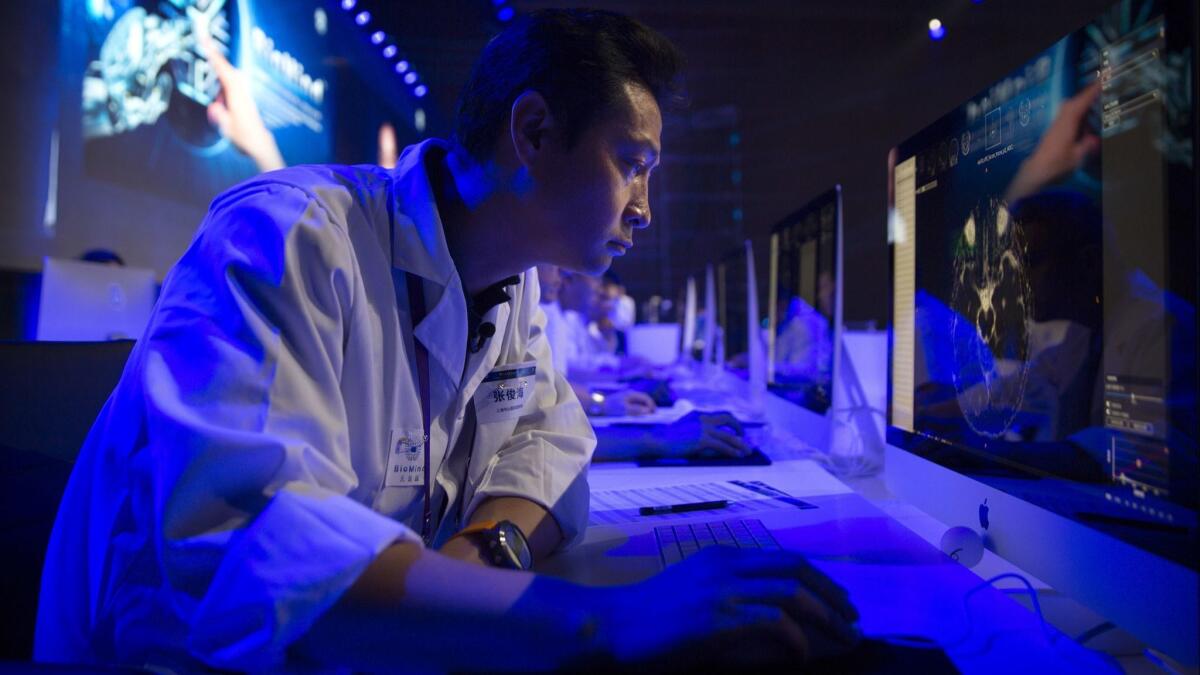Op-Ed: We can’t let China become the global leader in artificial intelligence

This July marks the 50th anniversary of an audacious technological achievement: Neil Armstrong setting foot on the moon. Since that moment, the United States has been the undisputed leader in all things high-tech.
But America’s dominance could be coming to an end. China aspires to be No. 1, and may very well get there.
American leaders are taking notice. A committee headed by Sen. Marco Rubio (R-Fla.) recently released a report stating that Made in China 2025, the high-tech industrial plan Beijing announced a few years ago, is not just breaking the rules, but trying to reset them according to a Chinese agenda. Seven Democratic senators petitioned President Trump last month, urging him to hang tough with China on intellectual property and other major tech issues.
Technologists have long known that China is a serious competitor. It’s good that Washington is finally waking up. And yet, we still haven’t grasped the biggest threat. China is poised to win in high-tech because it is focusing heavily on one particular technology: Artificial intelligence.
What the Chinese government calls “civil-military fusion” is already underway.
AI is the 21st century technology most likely to generate social, economic and geopolitical disruption. The late Stephen Hawking said AI might be “the biggest event in human history.” Google Chief Executive Sundar Pichai has called AI the most profound innovation since electricity or fire. Russian President Vladimir Putin has asserted, ominously, that “whoever leads in AI will rule the world.”
Americans invented AI, and a majority of the field’s top experts live in the United States. Google, Amazon, Facebook, Apple and other large American companies build and operate the world’s smartest AI systems. Still, we are losing ground to China every day.
In the city of Hangzhou, the movements of millions of residents are monitored by an AI known as City Brain. Built by Alibaba (China’s Amazon), City Brain controls 1,300 key traffic lights and road signals, adjusting them based on real-time traffic flow and other environmental conditions. In just two years, City Brain transformed Hangzhou from one of China’s most traffic-clogged big cities to the only major city in Asia where road congestion is actually decreasing. It has dropped 15% over the last two years.
City Brain clears emergency routes automatically, halving response times for fire trucks and ambulances, and it is beginning to manage sustainable energy systems. The ultimate goal, according to Alibaba: “empowering cities to think.” Big Brother issues notwithstanding, the system is a major technological achievement.
City Brain is part of China’s New Generation AI Development Plan, a heavily funded initiative backed personally by President Xi Jinping. The express goal of this plan is to make China the world leader in AI. China’s AI industry grew 67% last year, according to Rubio’s report. China now publishes more scientific papers on AI than any other country.
China’s push to become the world’s AI powerhouse amounts to a 21st century moonshot. The stakes are higher than most Americans realize. But if we lose our AI dominance, the consequences will become clear.
As the global leader in AI, China would have a manufacturing advantage far more powerful than the one its cheap labor provided in the past. It would dominate financial markets, which already depend on AI systems. And it would lead innovation in sectors as diverse as transportation, healthcare and agriculture.
Most critically, China would take a decisive military lead. What the Chinese government calls “civil-military fusion” is already underway, with Alibaba, Baidu, Tencent and other tech leaders working to harness AI for military purposes.
Enter the Fray: First takes on the news of the minute »
To retain our leadership, Americans will need to put aside our dysfunctional political tribalism and recommit to the shared purpose of being the world’s technology superpower.
The U.S. government and the private sector should significantly increase investment in AI research. We need better AI education and job-training programs. (China already leads when it comes to AI education.) And the U.S. must immediately reopen its borders to the best and brightest technologists around the world.
The U.S. also needs collaboration between high-tech and the military, as well as new state and city policies that experiment with public-private collaboration in AI and assure that proper safeguards are in place.
As citizens, we must insist that AI systems be not just powerful, but sustainable, ethical, transparent and humane. We need to ensure, with legislation if necessary, that AIs remain fair and “friendly,” a technical term for systems that have a positive effect rather than a negative one. It’s a tall order. But not nearly as tall as putting a man on the moon.
Charles Jennings is a high-tech entrepreneur, the author of “Artificial Intelligence: Rise of the Lightspeed Learners,” and a co-author of “The Hundredth Window: Protecting Your Privacy and Security on the Internet.”
Follow the Opinion section on Twitter @latimesopinion or Facebook.
More to Read
A cure for the common opinion
Get thought-provoking perspectives with our weekly newsletter.
You may occasionally receive promotional content from the Los Angeles Times.










